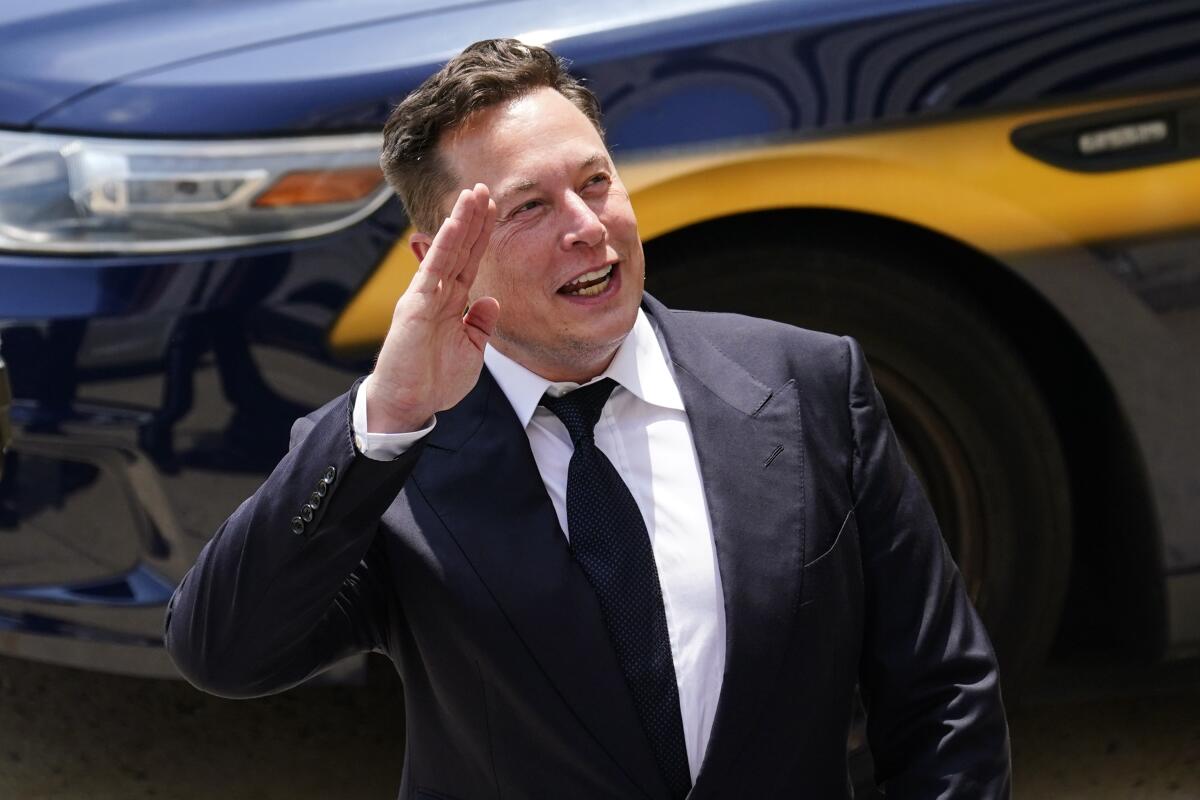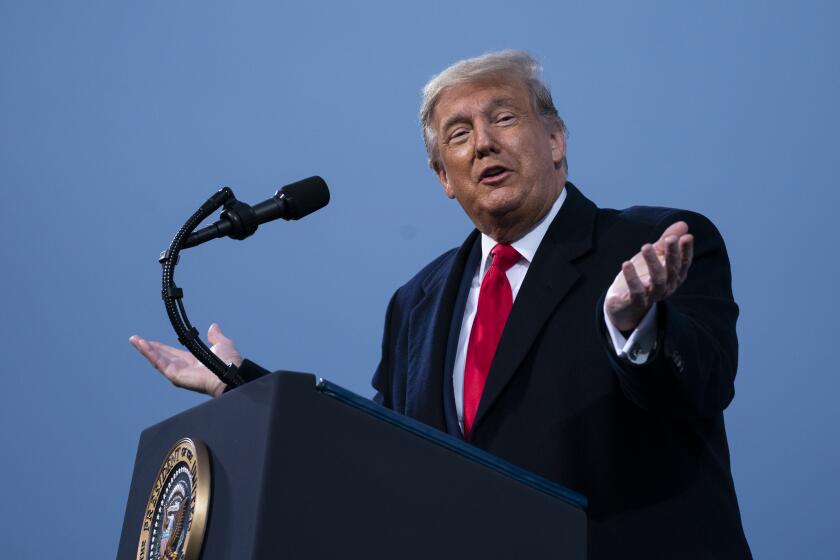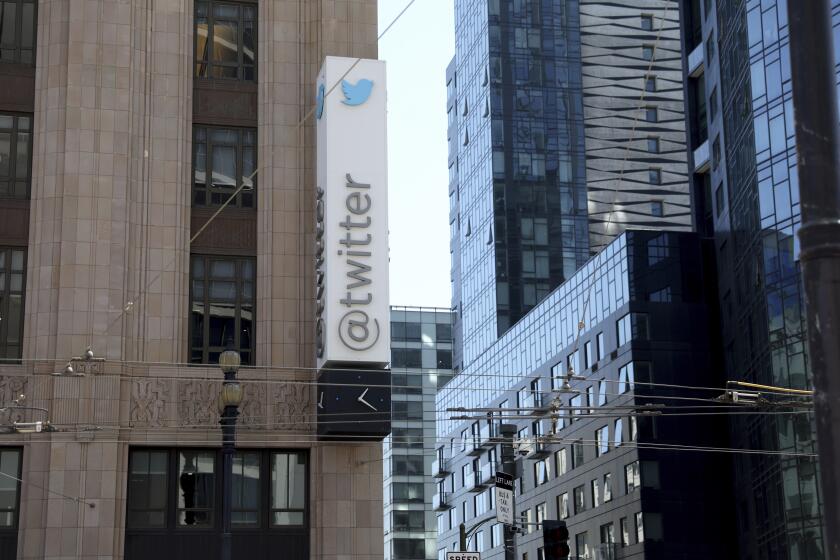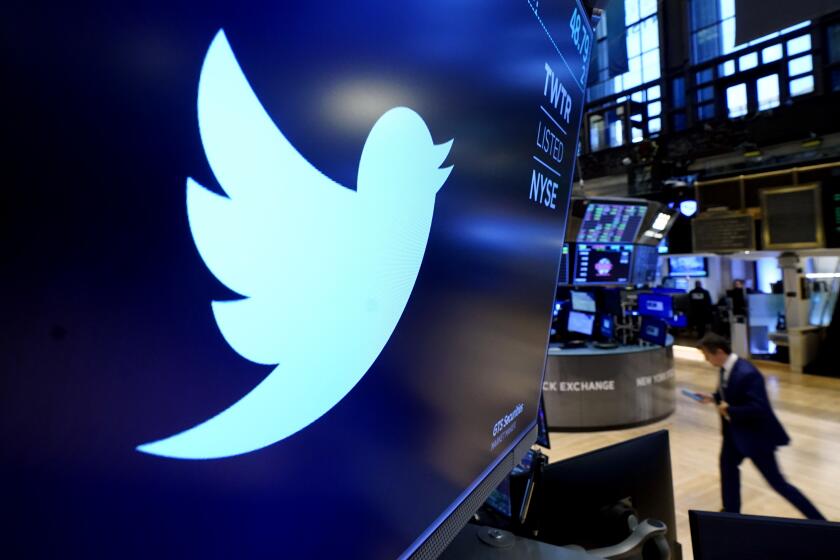Conservatives ecstatic about Elon Musk buying Twitter: ‘Time they get their comeuppance’

With tweets laden with exclamation marks and celebratory hashtags, Republicans on Monday made their mood abundantly clear: They were elated by the news Elon Musk was buying Twitter.
“WELCOME BACK FIRST AMENDMENT!” blared Rep. Jody Hice (R-Ga.), in all caps. A Twitter survey by Sen. Ted Cruz asked if Musk’s purchase was a good thing, with the only options to answer being “yes” or “no, I hate free speech.” His fellow Texan, Rep. John Carter, signaled his approval with no words at all; three clapping-hands emojis were sufficient.
A pot-smoking, meme-posting evangelist for electric vehicles may be an unlikely hero for conservatives. But the Tesla chief executive’s amorphous vow to restore free speech to the social media platform has resonated among Republicans, who see themselves — starting with their de facto leader, former President Trump — as unfairly targeted by Twitter’s content moderation efforts.
Conservatives said their euphoric outpouring was bigger than the possible return of @RealDonaldTrump and changes to Twitter’s ownership. Rather, they see Musk’s takeover as a symbolic, and cathartic, blow against Big Tech, which the right has increasingly viewed with antipathy.
“There’s a gut reaction from a lot of people, going, ‘You know what, it’s about time they get their comeuppance,’ ” said Rep. Bill Huizenga (R-Mich.). “It finally feels like someone is standing up for a principle that has been going in an opposite direction lately: less free speech, less ability to express yourself — if you are a conservative.”
Musk centered his bid for Twitter on the premise that the social media company, which he considers a “digital town square,” is too restrictive in clamping down on expression.
“I hope that even my worst critics remain on Twitter, because that is what free speech means,” Musk tweeted Monday morning.
Musk’s own politics are idiosyncratic. He’s the foremost face of clean vehicles who called for immediately increasing oil and gas production after the Ukraine-Russia war spiked energy prices. He fled California for Texas because of high taxes but declined to weigh in on Texas’ restrictive abortion law, saying he preferred to “stay out of politics.” He has described himself as politically independent and registered to vote in California with no party preference.
For conservatives, Musk’s crusade against content restrictions has struck a chord. Roughly half of Republicans feel they cannot express themselves freely on social media platforms such as Twitter and Facebook, according to a Morning Consult poll conducted this month, far exceeding the percentage of Democrats and independents who felt similarly.
Could banned Trump allies return to Twitter under Elon Musk? A look at the former president’s backers who were kicked off the social media platform.
“Twitter is a platform that I and many others believe has been more aggressive in blocking Republicans and conservatives than they have toward people on the left,” said Rep. Austin Scott (R-Ga.). “I’m hoping and expecting he will undo that.”
Scott is not an avid Twitter user; he does not even have the app on his phone. But he did tweet a congratulatory message to Musk, adding a plea to “restore free speech and bring back President Trump!”
Trump was permanently kicked off the platform on Jan. 8, 2021 — two days after a group of his supporters overran the U.S. Capitol in hopes of blocking the certification of Joe Biden’s win. Twitter imposed the ban “due to the risk of further incitement of violence.”
So far, Musk has not indicated how he’d handle the former president’s account. Trump, meanwhile, has shown no interest in rejoining the platform that helped power his political rise and gave real-time narration of his presidency.
“I am not going on Twitter, I am going to stay on Truth,” Trump told Fox News, referring to his fledgling social media network. “I hope Elon buys Twitter, because he’ll make improvements to it, and he is a good man, but I am going to be staying on Truth.”
Republicans see Trump as just one example of Twitter’s bias. A number of high-profile conservatives have been suspended or blocked from the platform, including the account of the Babylon Bee, a satirical news website that was suspended for a tweet naming Assistant Health Secretary Rachel Levine, who is transgender, “Man of the Year.”
The account was locked as a violation of Twitter’s ban on hate speech. Seth Dillon, CEO of Babylon Bee, refused to remove the tweet, asserting that “truth is not hate speech.”
“It’s completely broken,” said Harmeet Dhillon, a conservative lawyer who has sued Twitter multiple times on behalf of clients who were banned. “The company can try to affect elections, try to ban politicians from speaking ... use algorithms, enable false accounts to constantly affect what people see.”
The extent to which conservatives face bias on the platform has been fiercely examined and debated. A study this month by researchers at MIT and Yale found that Republican users tend to be suspended more often than Democrats but that conservatives are more likely to share misinformation that would provoke such suspensions.
So far, Musk has offered little explanation as to how his free speech values would play out in practice. He said on Monday that his goals include “enhancing the product with new features, making the algorithms open source to increase trust, defeating the spam bots and authenticating all humans.”
His approach may have seemed unconventional or half-baked, but Elon Musk’s strategy to buy Twitter was based on sound negotiation principles, experts say.
But such efforts would require some attempt at regulating content, especially by verifying users. A social media network without any moderation at all could swamp the platform with all sorts of unsavory or offensive material, such as pornography or terrorist content, as well as the online abuse and harassment that are already common occurrences.
“If you don’t have content moderation, you actually have less free speech. The people who are the loudest are the bullies and harassers that drive people away,” said Katie Harbath, a former Republican operative who has worked as public policy director for Facebook.
Dhillon, the conservative attorney based in California, said she is not hoping for Musk to completely abandon regulation.
“There’s plenty of room for them to do old-school content moderation of the kind they originally did,” she said, citing as an example prohibitions on making death threats.
Here’s how Elon Musk’s deal to buy Twitter works and what it could mean for shareholders.
With Musk’s plans still unknown, Harbath, who now runs a tech policy strategy firm, said the celebratory conservatives “are making a hell of a lot of assumptions of what Elon means by all this stuff. I don’t think they should assume he is completely on their side.”
Republicans’ triumphant tone on Twitter starkly contrasted with the more muted reaction from liberal politicians. Far fewer Democratic members of Congress weighed in on Twitter, although those who did were markedly unenthused.
“This deal is dangerous for our democracy. Billionaires like Elon Musk play by a different set of rules than everyone else, accumulating power for their own gain. We need a wealth tax and strong rules to hold Big Tech accountable,” said Sen. Elizabeth Warren (D-Mass.), with whom Musk has sparred on Twitter.
Huizenga, the Michigan congressman, expected that liberals would be none too pleased with Musk’s purchase. Indeed, some vowed to leave the site entirely — much to Huizenga’s amusement.
“It seems like ‘I’m quitting Twitter’ has become the ‘I’m moving to Canada if Trump wins,’ ” he said, adding, “It’s kind of fun sitting back, watching them completely lose their collective minds.”
The community of millions that figured out how to turn Twitter into a platform for real-world activism and power won’t survive this $44-billion deal.
More to Read
Get the L.A. Times Politics newsletter
Deeply reported insights into legislation, politics and policy from Sacramento, Washington and beyond. In your inbox three times per week.
You may occasionally receive promotional content from the Los Angeles Times.














